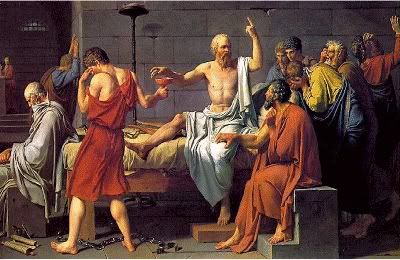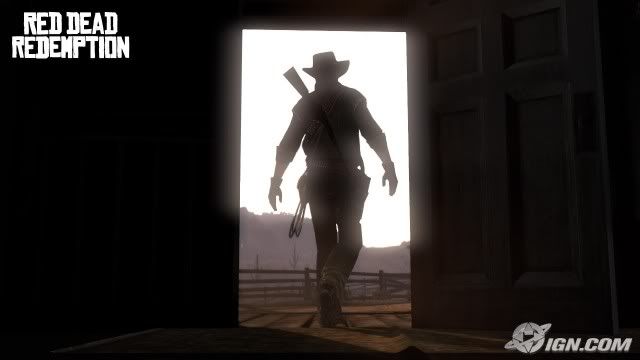But when I started working on games, I quickly realized that their relation to mimesis—the relation, more-or-less, that I now call "practomime"—meant that I would be able eventually to say about epic, tragedy, and Plato in relation to games precisely what I'd always wanted to say about them in relation to psychoanalytic theory. Moreover, if I said it in relation to games people might actually read and even enjoy it.
Briefly, what I wanted to say then about e.g. Oedipus the King, and what I want to say now about Red Dead Redemption, is that characters are actually produced by the audience of a performance, and not by the text of a drama, or a game, or even by the enactment of that drama or game. Like I say above, I could spin you a lot of theory on this subject. Just to assuage my scholarly super-ego, I suppose I'll drop some names in telegraphic fashion: Lacan, Fineman, Benveniste, Calame, Loraux, Silverman. Ah. I feel better now.
A character, that is, is the impression of subjectivity that arises from discourse organized around a peformance as a subject. To put it another way, when a tragedy or a video game shows us and tells us that a bunch of signifiers of various kinds (including images and inarticulate sounds) is supposed to be like a person, we get the impression that it's a person. That's a character—not the signfiers, but the impression: it's what we do with the signifiers that makes the character.
That's what was in my subconscious, I think, last night as I tried to work out my relationship with John Marston. The character-impressions of a practomime (or game, if you like) are obviously going to differ in certain very important ways from those of an epic or a tragedy or a film-Western. The problem, though—and by "problem" here, I mean not to criticize but to critique—, is that John Marston frequently becomes a character who's much more recognizable as a film-Western character than as a practomime character.
Practomime characters, just for the sake of argument, though I think there's probably a book waiting for me out there about this topic, if not about the equivalent one in Athenian tragedy, are characters like the player-character in Star Wars: Knights of the Old Republic (KOTOR) and Bioshock. To oversimplify vastly, they don't talk in cutscenes, and they don't talk during missions. Famously, in Bioware games like KOTOR and most recently DragonAge: Origins, they listen while other characters talk during missions and especially cutscenes.
John Marston, however, like other characters in recent Rockstar games (Niko Bellic is the other notable example), won't shut up. His cutscenes are full of pithy observations about the state of the West. When he's riding to town with his new patroness Bonnie he's full of long-winded though evasive answers, and even asks a few questions about her upbringing. During these moments, even when I'm controlling the wagon or the horse, I tend to wonder if I would have phrased things the same way John would—or, to put it another, less charitable way, the character-impression tends to disappear.
My critical instincts are screaming at me to gesture towards a reading of Red Dead Redemption's practomimetics of character as thematizing alienation, and to throw in some kind of filip about such a reading perhaps being helpful in understanding Grand Theft Auto IV's Niko better than we have so far. I'm not sure that kind of reading would be wrong, either: Marston seems like a pretty alienated guy, and the cutscenes definitely distance me from him, causing me to develop a sort of snap filmic character-impression of him, as if Red Dead Redemption were a practomime in which my character, Mejohn Marston, every so often gets to take a load off his feet, sit down on my couch, and watch a movie about a guy not entirely unlike him living a life not entirely unlike his, just more alienated.
But I think there's something more immediate going on here—something that involves genre, and makes me think of a discussion I had with Michael Abbott on the Critical-Distance podcast back when we were all just speculating about what Red Dead Redemption would be like. I theorized then that the Western hero, as fundamentally a cipher a la Shane or various John Wayne roles like the Ringo Kid of Stagecoach, could well be a perfect player-character for a practomime. A cipher—that is, a performative organization of discourse as metaphoric person—allows for really robust character-impressions, as players bring the character to life, and the ethical ambiguity of the Old West is a perfect backdrop against which to make practomimetic choices that let players explore their own inner landscapes.
I could be critical in two ways on this subject, I think, evaluative or descriptive: I could say that Rockstar failed to realize that generic potential and that we still await a truly profound Western practomime, or I could say that their refusal to make John Marston as much of a cipher as he could be forces the player to pay closer attention to the character-impressions he or she is forming. Like the alienation reading, that one may also be true, whether or not the dev team was thinking along those lines at all.I also like this latter one better, since it makes me feel better about the $60 I spent.
In the end, I believe the quasi-Western honesty of that critical transaction gives me more satisfaction than I could ever have expected from trying to find theory-imbued excuses for why Aeschylus' characters are flat, in an attempt to convince a university press' anonymous readers that I deserve another credit on my CV, for a book I'd be lucky to get even my graduate students to read.
Westward ho!



